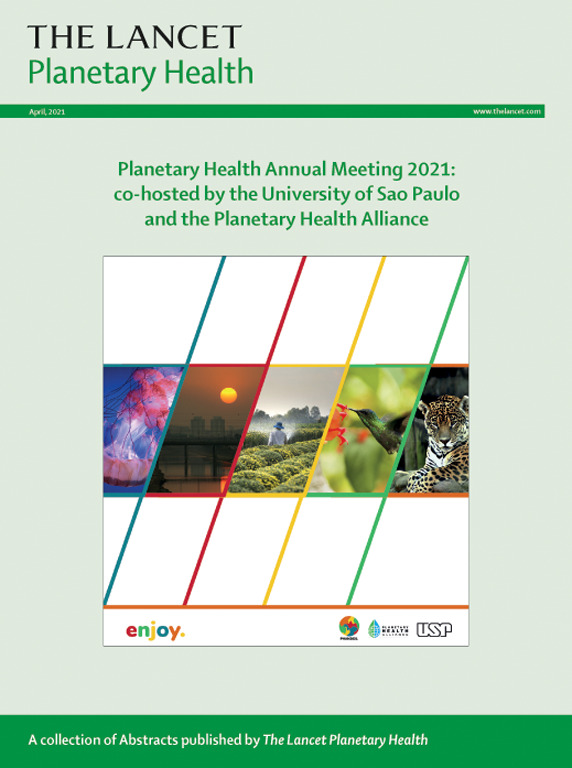Effects of a coal to clean heating policy on acute myocardial infarction in Beijing: a difference-in-differences analysis
IF 21.6
1区 医学
Q1 ENVIRONMENTAL SCIENCES
引用次数: 0
Abstract
Background
In 2015, the Chinese Government launched the coal to clean heating policy (CHP), designed to improve air quality and health in China. The CHP banned household coal burning and provided subsidies for clean electric or gas-powered heating for millions of peri-urban and rural households. We aimed to investigate whether the CHP affected the incidence of acute myocardial infarction in Beijing townships.
Methods
In this quasi-experimental study, we obtained township data on acute myocardial infarction hospital admissions and deaths, exposure to the CHP (yes vs no), and a range of covariates for periods before (Jan 1, 2013, to Dec 31, 2014) and after the CHP began (Jan 1, 2016, to Dec 31, 2017; and Jan 1, 2018, to Dec 31, 2019). The policy was gradually rolled out across villages, and townships in our study were considered exposed to the policy in periods when more than 50% of their villages were assigned into the CHP. We estimated the effect of the CHP on township incidence of acute myocardial infarction for all adults (aged ≥35 years) and separately for sex and older adults (aged ≥65 years) using a difference-in-differences approach that accommodates the progressive roll-out of the policy.
Findings
Of 307 townships in Beijing, we excluded 156 (51%) urban townships where most villages had central heating and were thus ineligible for the CHP. Of the 151 peri-urban and rural Beijing townships considered eligible for the CHP, 75 (50%) townships were exposed to the CHP by the end of 2017 and 92 (61%) by the end of 2019. We estimated an overall reduction of 6·6% (95% CI –12·3 to –0·8) in the incidence of acute myocardial infarction from before to after roll-out of the CHP in exposed townships relative to those not exposed to the policy, with some evidence of larger effects in women (–11·7% [–19·0 to –4·1%]), older adults (–10·7% [–17·4 to –3·6%]), and in townships exposed for longer (–3·5% [–9·5 to 2·8%] after <2 years and –9·7% [–18·3 to –0·5%] after 2–4 years).
Interpretation
Our results provide among the first empirical evidence of possible cardiovascular benefits from a household clean energy policy, and support efforts to implement and assess such policies in China and globally.
Funding
Wellcome Trust, the Canadian Institutes for Health Research, and the National Natural Science Foundation of China.
煤改清洁取暖政策对北京急性心肌梗死的影响:差异分析
背景2015年,中国政府启动了煤改清洁取暖政策(CHP),旨在改善中国的空气质量和健康状况。该政策禁止家庭燃煤,并为数百万城市周边和农村家庭提供清洁电能或燃气供暖补贴。方法在这项准实验研究中,我们获得了关于急性心肌梗死入院和死亡、是否接触过卫生防护计划(是与否)以及卫生防护计划开始前(2013 年 1 月 1 日至 2014 年 12 月 31 日)和开始后(2016 年 1 月 1 日至 2017 年 12 月 31 日;2018 年 1 月 1 日至 2019 年 12 月 31 日)的一系列协变量的乡镇数据。该政策在各村逐步推广,在我们的研究中,当乡镇有 50%以上的村被分配到卫生防护中心时,该乡镇就被认为受到了该政策的影响。在北京市的 307 个乡镇中,我们剔除了 156 个(占 51%)城市乡镇,因为这些乡镇的大部分村庄都有集中供暖,因此不符合享受居民健康计划的条件。在被认为符合热电联产条件的 151 个北京近郊和农村乡镇中,有 75 个乡镇(50%)在 2017 年年底前采用了热电联产,92 个乡镇(61%)在 2019 年年底前采用了热电联产。我们估计,与未接触该政策的乡镇相比,接触过卫生防护计划的乡镇急性心肌梗死发病率从政策实施前到实施后总体下降了 6-6%(95% CI -12-3 到 -0-8),有证据表明,在女性(-11-7% [-19-0 到 -4-1%])、老年人(-10-7% [-17-4 到 -3-6%])和接触时间较长的乡镇(<;2年后为-3-5%[-9-5至2-8%],2-4年后为-9-7%[-18-3至-0-5%])。解释我们的研究结果首次提供了家庭清洁能源政策可能给心血管带来益处的实证证据,为在中国和全球实施和评估此类政策提供了支持。
本文章由计算机程序翻译,如有差异,请以英文原文为准。
求助全文
约1分钟内获得全文
求助全文
来源期刊

Lancet Planetary Health
Multiple-
CiteScore
28.40
自引率
2.30%
发文量
272
审稿时长
8 weeks
期刊介绍:
The Lancet Planetary Health is a gold Open Access journal dedicated to investigating and addressing the multifaceted determinants of healthy human civilizations and their impact on natural systems. Positioned as a key player in sustainable development, the journal covers a broad, interdisciplinary scope, encompassing areas such as poverty, nutrition, gender equity, water and sanitation, energy, economic growth, industrialization, inequality, urbanization, human consumption and production, climate change, ocean health, land use, peace, and justice.
With a commitment to publishing high-quality research, comment, and correspondence, it aims to be the leading journal for sustainable development in the face of unprecedented dangers and threats.
 求助内容:
求助内容: 应助结果提醒方式:
应助结果提醒方式:


